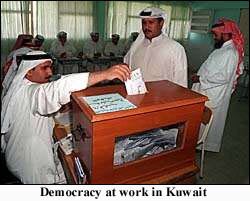 |
| Vol. 3 No. 11 | Table of Contents MEIB Main Page | November 2001 |
Nadeya Sayed Ali Mohammed is a post-doctoral research fellow at York University in Canada and a contributing writer for Oxford Analytica, an international consulting firm. She received her D.Phil in Modern Middle Eastern Studies at Oxford University. Her academic work has received an award from the Population Council, the British Council's FCO Award (for two years), and the Walter Zander Prize from St. Antony's College. Her doctoral dissertation, "Population and Development of 3 Gulf States" is currently under review for publication as a book.
 |
Who is Next?
Since the death of Mubarak the Great in 1915, Kuwait's emirs have generally alternated between the descendants of his two eldest sons, Jabir and Salim. The only exception to this rule was in the 1960s, when Sheikh Abdullah al-Salim al-Sabah was succeeded by his brother, Sheikh Sabah al-Salim al-Sabah. The alternation to the Jabir line was restored in 1977 with the succession of Sheikh Jabir.
With Sheikh Jabir incapacitated, Crown Prince and Prime Minister Sheikh Saad al-Abdullah al-Sabah,2 of the Salim line has taken over most of his duties. However, Sheikh Saad is not very popular, due to his background in police and security and his distrust of the parliament. Moreover, he is 71 years old and has been in poor health since undergoing colon surgery in 1997. Low blood-sugar levels led him to spend several months abroad in July 1999. Since February, Sheikh Saad has delegated extensive authority to his rival, First Deputy Prime Minister and Foreign Minister Sheikh Sabah al-Ahmad al-Sabah3 of the Jabir line. While he is more popular and has good relations with parliament, Sheikh Sabah is 72 years old and has recently had a pacemaker installed.
The Challenging Political Context of Kuwait
It is not the issue of succession per se that could potentially destabilize Kuwait. It is the context within which the succession will play out - a power struggle with parliament that is likely to intensify, a challenging economic reform program, a divided society and the Islamic resurgence - which may threaten the political process within Kuwait.
Political Power Struggles
Earlier this year, prior to parliament's Summer recess, MPs were making a concerted push for meaningful political reforms, such as separating the posts of Crown Prince and Prime Minister. Demands for political reform occurred within a context of attacks against alleged state corruption (in defense deals, poor management leading to large financial losses and nepotism in appointments, especially in favor of younger members of the ruling Sabah family, who "jump" on key posts, violating constitutional guarantees of equality) and concern over possible revival of disputes within the ruling family. Fraud cases amounting to $130 million against Sheikh Ali al-Khalifa al-Sabah, an ex-minister, have been of particular concern in parliament.
Tensions have tended to rise when parliament wants to question cabinet ministers (specifically those who are members of the Sabah family: foreign affairs, defense, interior, finance, and currently, oil), often leading to political crises, followed by cabinet resignations or the dissolution of parliament, as was the case in 1976, 1986 and 1999. On July 3, 1986, Emir Jabir dissolved the parliament in the wake of its continual criticism of the government and the ruling family, allegations of a coup plot, and concerns about the Iran-Iraq war. In May 1999, the Emir dismissed the 50-seat house, hours after legislators threatened to remove the Islamic affairs minister for mistakes in 120,000 printed copies of the Quran. The constitution was upheld, however, and elections were called within the stipulated 60 days.
Challenging Economic Reform
The growth of the Kuwaiti economy in 2000 remained weak, with real GDP rising 1.7%, reflecting the cuts in government capital expenditure and initial uncertainty regarding the legislative approval of structural reform measures. Despite a rise in crude oil production, the growth of oil GDP (including refining) was dampened by a reduction in refinery output due to fire damage. Kuwait recorded trade and budget surpluses (of $5-$6 billion) in 1999/2000 and 2000/2001. For 2001/2002, Kuwait is forecasting a budget deficit of around $6 billion, but this assumes oil prices of $15 per barrel.4 If Kuwait continues to receive $23-$25 per barrel for its oil, it is likely to experience a significant budget surplus once again. Despite this, the government is moving ahead with its economic reform plans.5
The National Assembly has passed elements of the reform package, including key labor market reform measures (May 2000) and laws on foreign portfolio investment (September 2000).6 In March 2001, the government introduced an economic reform package which eased restrictions on foreign banks, provided long-term protection to foreign investors against nationalization or confiscation and eliminated the requirement for foreign companies to have a Kuwaiti sponsor or partner. Additional measures that do not require legislative approval were introduced, such as increases in fees and charges on government-provided services. Remaining on the agenda are the long-promised reforms of cutting non-development spending, specifically the generous government subsidies, and privatization of the state-owned non-oil sector - health care, electricity, and telecommunications.7 Privatization, possibly starting to take shape by early 2003, is rendered difficult by the need to protect Kuwaitis, 93% of whom are (under)employed in state-owned enterprises and the government, from unemployment. In addition, privatization would threaten the power of those who currently benefit from state control of corporations. Therefore, it is expected that privatization will heighten tensions in Kuwaiti society, especially given the opposition of some MPs in Kuwait's parliament to it. Such economic reform plans with their implications of unemployment, higher costs for consumers and reduction in subsidies, will be extremely difficult to implement, and may present serious political risks if implemented within a context of a succession crisis.
Societal Divisions
The Gulf War served to increase the Kuwaiti population's expectation for a more egalitarian society and greater democratic participation. Yet Kuwaiti society remains divided.
Women have been demanding the right to vote since 1999, when the Emir decreed that Kuwaiti women should have the same rights as male citizens. It needs ratification by the parliament to become law. However, in November 1999, the parliament, facing strong opposition from its Islamist and tribal members, voted down a proposal to give women the right to vote, on the grounds that Islam and Kuwait's traditions forbid women from standing for public office.8 Since then, activists have filed several cases in Kuwaiti courts seeking political rights. In July 2000, Kuwait's Constitutional Court dismissed four lawsuits filed by women who argued that Kuwait's electoral law barring females from voting was unconstitutional. In March 2001, a Kuwaiti parliamentary committee yet again rejected a draft law (this time on procedural grounds) aimed at granting women the rights to vote and run for office, while Kuwait's Constitutional Court rejected another appeal against the law banning women from participating in municipal and parliamentary elections.9
Sectarian and tribal rifts in Kuwaiti society often surface when least expected, as in August 2000 with the housing policy debate. Housing Minister Adel al-Sabaih, a member of an influential old Sunni urban merchant family who had traditionally controlled the government and the economy, was nearly impeached as Leftists, liberals, and urbanites sided with Sabaih, while tribal loyalists and Shi'ites challenged him. Sunnis accused the Shi'ites of seeking revenge because Sabaih, an ex-Islamic affairs minister, had refused to approve the construction of a Shi'ite mosque.10 Such rifts will only widen were the political leadership to weaken, given the nature of economic reform issues that are to be tackled.
Islamists
 |
Conclusion
Within hours of the Emir taking ill, his duties in Kuwait were taken over by the Crown Prince and prime minister, Sheikh Saad, while the Emir's brother, Sheikh Sabah took over as the acting prime minister to run the day-to-day affairs of the state. All Gulf States royal families sent in their wishes for a speedy recovery, to underline their continued support for the Al-Sabah family. However, the next few months will be critical for the Al-Sabah family, and given the context, they cannot afford to publicize any internal differences that may arise (as when Sheikh Sabah submitted his resignation to the Emir because of differences with Sheikh Saad12).
Regardless of how a future succession transpires, there is likely to be little change in Kuwait's relations with the West, precisely because all Kuwaitis, including the Islamists, realize that they need the Americans to defray any potential future Iraqi threat. In fact, Kuwait's continuing support of American regional policies was strongly reiterated by the Crown Prince upon the announcement of the Emir's poor health. The impact of the succession is likely to be greater on Kuwait's internal politics.
Notes
1 Sheikh Jabir al-Ahmad al-Sabah, from Jabir line of descent (1915-1917), through his son Sheikh Ahmad (1921-1950), became Emir of Kuwait on December 31, 1977, upon the death of Sheikh Sabah al-Salim al-Sabah. He was born, in 1929 to Sheikh Ahmad, then-ruler of Kuwait, and Sheikha Bibi Salim al-Sabah, a royal cousin. After education in local private schools and palace tutors, he became chief of public security in the Ahmadi oilfields in 1949. In 1959, he headed the Department of Finance, which, after Kuwait declared independence in 1962, became the Ministry of Finance. In 1963-65 he was simultaneously deputy prime minister. With the death of Sheikh Abdullah al-Salim al-Sabah in 1964, and until 1977, Sheikh Sabah al-Salim, Sheikh Abdullah's brother, was the Emir. To ensure that the succession would revert back to the Jabir line, Sheikh Jabir was named Sheikh Sabah's heir apparent, and Prime Minister. Sheikh Jabir is one of the "most-married" Gulf rulers, since he has used marriage as a means of cementing tribal alliances, and therefore has many children.
2 Sheikh Saad al-Abdullah al-Sabah, Kuwait's Crown Prince and Prime Minister since 1978, is the heir to the Salim line of descent from Mubarak the Great. He was born in 1929 to Sheikh 'Abdullah, and Sheikha Jamila, who was of African origin. He studied in Kuwait, and the Hendon Police School in England, after which he returned in 1945 to work as deputy head of the Metropolitan Police in Kuwait. In 1959 the Police and the Public Security Departments were amalgamated, making Sheikh Saad deputy commander. With independence, he became chief of police and public security and then minister of the interior, a post he held until 1978, after which he became minister of defense. He is married to Sheikha Latifa Fahad al-Sabah, and has one son and four daughters.
3 Sheikh Sabah al-Ahmad, the brother of the Emir, Sheikh Jabir, and foreign minister since 1963, has been a more visible representative of the Jabir side of the family. Known as a defender of Parliament, he will most likely become the Crown Prince if Sheikh Saad were to became emir. In 1955 he headed the Department of Social Affairs and Department of Printing and Publishing. In 1962, he became minister of guidance and news. As minister of foreign affairs, he headed the Kuwaiti delegation seeking admission to the UN (blocked for two years after 1961 by Iraq). He has also held other positions: acting minister of finance and oil (1965-67), acting minister of the interior (1978); acting minister of information (1971-75, 1981-82), and minister of information (1982-85). He has been deputy prime minister since 1978 and is currently first deputy prime minister. He has two sons and one daughter with his wife, Futuwwa Salman Hamoud al-Sabah.
4 Gulf News, 28 June 2001.
5 IMF, Public Information Notice (PIN) No. 01/60, 29 June 2001.
6 IMF, Public Information Notice (PIN) No. 01/60, 29 June 2001.
7 AFP, 9 April 2001.
8 Inter Press Service, 26 May 1999; BBC World Service, 9 November 1999.
9 Gulf News, 19 March 2001.
10 Gulf News, 8 December 2000.
11 Al-Khaleej Times, 11 July 2001.
12 Gulf News, 8 December 2000.